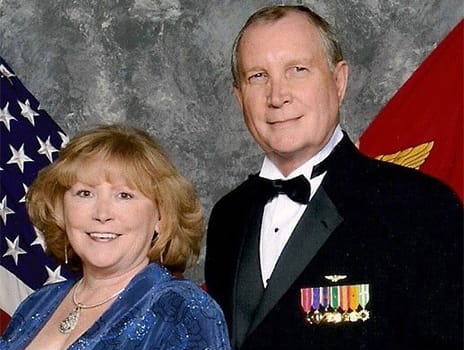- Home
- News Room
- Patient Stories Search Page
- Veteran Takes on Blood Cancer with a Fighting Spirit
August 30, 2019
Larry Franke does not shy away from the big moments. As a Vietnam veteran, U.S. Marine Corps jet fighter pilot, father and grandfather, extensive traveler and astute businessman, the 72-year-old often finds himself at the heart of the action. A cancer diagnosis last winter would set him on course for his toughest battle yet.
A blood cancer diagnosis
In early 2015, Larry just didn’t feel like himself. As a self-described “proud old Marine,” he could shake a lot of things off, but he was so weak and tired that he passed out during a business luncheon in March.
At an area hospital, his blood counts showed abnormalities, and when initial treatment failed to help, his physician referred him to The University of Kansas Cancer Center, where he met with Joseph McGuirk, DO, medical director of the blood and marrow transplant program (BMT).
After a bone marrow biopsy, Dr. McGuirk diagnosed Larry with the most aggressive form of myelodysplastic syndrome (MDS), a type of blood cancer that interrupts the production of healthy blood cells.
“This was the first time I heard the word ‘cancer,’ and to say it was a shock doesn’t do the memory justice,” Larry says.
With no treatment, Larry was given 4 to 6 months to live. An allogeneic blood stem cell transplant could give him a chance of surviving cancer – a prospect that appealed to Larry’s fighting spirit.
“For me, this was a no-brainer,” he says. “I guess my attitude has always been to attack the illness. My response was, 'I just need to know where to sign up.’”
This is a really challenging time for him. I told him to think of this part of the battle as waiting for reinforcements to come in. –Joseph McGuirk, DO
Medical director, blood and marrow transplant program
Fixing his sights on cancer
A donor match was found, and Larry received intense chemotherapy and radiation to ready his body for the transplant.
“In this case, the chemotherapy is not what wipes out the cancer,” says Dr. McGuirk. “The idea is to decrease the disease burden of the cancer cells and make room for donor cells. These donor cells help grow a new immune system that ultimately fights the cancer.”
The transplant took place in June. After the procedure, Larry is still in the heat of battle, however. With his complex case, he was given a 50-60% chance of relapse, and his condition did just that. Now, he is prepping for a bone marrow “boost” procedure which will add more donor cells to his blood to give him another shot at defeating his MDS.
“We are in the thick of things right now,” Dr. McGuirk explains. “This is a really challenging time for him. I told him to think of this part of the battle as waiting for reinforcements to come in.”
It is not his 1stexperience with adversity, though waiting is the hardest part.
“My body, being a proud Marine, has fought really hard to not let any foreign invaders in,” says Larry. “But it’s easier to be in the middle of the fight than waiting for progress.”
Beating the odds
Larry has never been one to shy away from risk. As a fighter pilot in Vietnam, he literally flew into the face of danger. In 2001, he helped crash-land the Learjet he was co-piloting after its tail malfunctioned. At the age of 18, he opted for a risky experimental surgery to restore use of his hand after a car crash left him with severe nerve and muscle damage. And now he brings that same tenacity to his greatest challenge yet.
“He is just a remarkable, stoic guy – a true hero,” Dr. McGuirk says.
It is this heroic, fighting spirit that Larry tries to hold onto as he works with the cancer care team for a fighting chance.
Larry Franke’s heroic battle with cancer came to an end on November 18, 2015. Described as “a true hero,” by his physician, Larry’s fighting spirit never wavered throughout his cancer journey.
Request your appointment today.
To make an appointment at The University of Kansas Cancer Center, call 913-588-1227.
